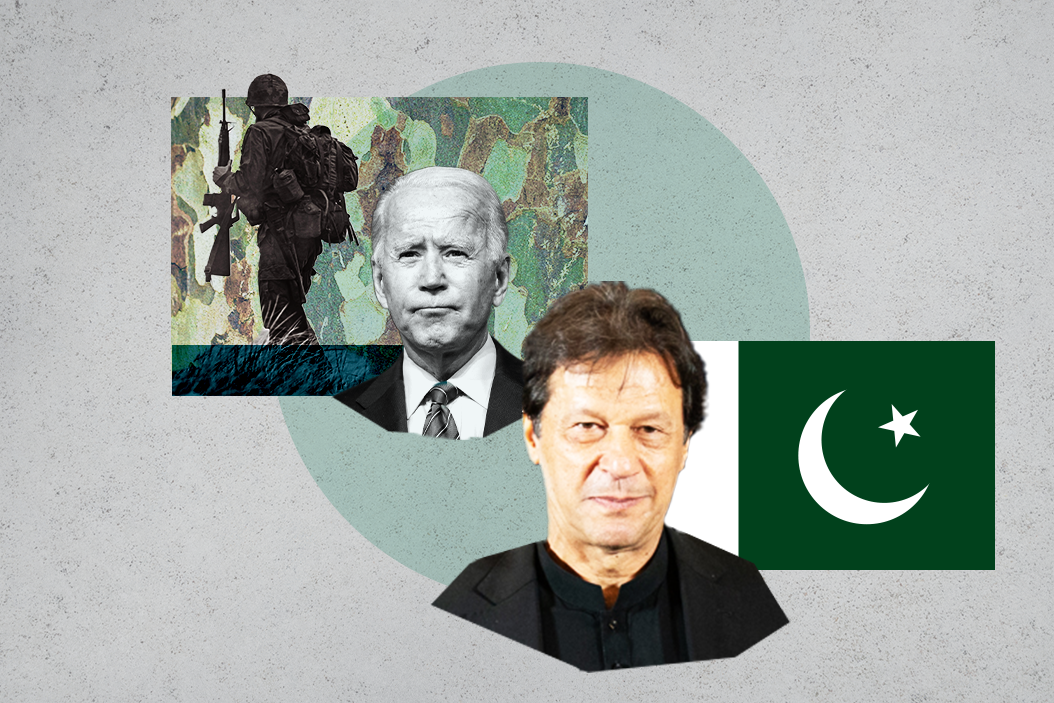As the US withdrawal from Afghanistan is now well underway, all eyes have turned to a country at the heart of the decades-long struggle for dominance there… Pakistan, where the effects of 20 years of Afghan war have been felt acutely.
Background. During the Cold War, the US and Pakistan worked closely together to foment jihadist resistance to Soviet influence in, and then occupation of, Afghanistan. But after the Soviet collapse, the bilateral relationship got more complicated, especially post 9/11, when the US went to war against the Afghan Taliban regime that still enjoyed close ties to the highly influential Pakistani military.
The Americans want more. Withdrawing now after 20 years of war, the CIA and other US intelligence and security forces still want to maintain a foothold in the region to monitor terror groups — like the Islamic State and al-Qaeda — as well as to surveil the Taliban, which has made massive territorial gains in recent weeks.
Washington has asked Pakistan's Prime Minister Imran Khan for access to its airspace and military bases to continue its surveillance operations and launch combat missions in the (expected) event of a Taliban takeover. But Khan has said, unequivocally, that he won't acquiesce to these demands.
Indeed, Pakistan's government has a host of domestic and geopolitical considerations to take into account in the face of US pressure. For example...
The power of the security apparatus. Pakistan's security establishment is described by critics as a "state within a state." The extensive Inter-Services Intelligence agency has historically maintained close ties with regional terror groups and provided intelligence to the Afghan Taliban in the post-Soviet era. More recently, senior ISI officials were reportedly involved in harboring 9/11 mastermind Osama bin Laden, who in 2011 was discovered hiding in a compound just a stone's throw away from the Pakistan Military Academy.
There's no doubt that the ISI plays a significant role in framing Pakistan's foreign policy, and now it's warning Khan against making overtures to the Americans.
Pakistanis don't love America. After 9/11, Pakistanis were mostly supportive or indifferent on whether its leadership should allow US forces to traverse Pakistan, a role that earned the country the designation of a major non-NATO ally and the money that comes with it. US aid to Pakistan after a devastating earthquake in 2005 also earned the Americans goodwill.
But that changed after a series of US drone attacks in Pakistan during the "War on Terror" killed civilians and traumatized communities. It didn't help that the US breached Pakistani airspace to kill bin Laden.
By 2012, three-quarters of Pakistanis said America was "an enemy." And the antipathy only intensified when in 2017 President Trump chided Pakistan for harboring terrorists and then — playing on Pakistanis' worst insecurities — called on India to play a bigger role in maintaining stability in Afghanistan. Clearly, it would be political suicide for Khan and his ruling Pakistan Tehreek-e-Insaf party to pursue an agreement with the Americans, who are loathed by a majority of his constituents.
Pakistan's former foreign minister, Hina Rabbani Khar, told GZERO Media that "the reason the US is getting out of Afghanistan in an almost rushed manner is because of the opposition in some quarters in Afghanistan to foreign bases and foreign troops." She said that if the US sets up bases in Pakistan, "we end up channeling all of that rage and extremist reaction towards Pakistan. I think it's safe to say that every country's primary responsibility is to protect itself and its own."
Global friends and foes. The world was a very different place when the US invaded Afghanistan (2001) and Iraq (2003). Back then, Pakistan was way more reliant on the United States, the singular world power, for economic and military aid. That's no longer the case.
China, slated to become the world's biggest economy as soon as 2028, is much more invested in Afghanistan and Pakistan — and Central Asia more broadly. Importantly, it has made the China-Pakistan Economic Corridor, worth $46 billion, a flagship of its massive Belt and Road Initiative. Beijing has flushed Islamabad with cash in recent years, and it's paying off: PM Khan now says China has been one of Pakistan's most reliable friends in times of need.
Importantly, Pakistan also hopes that an increased Chinese presence in Afghanistan will help build a bulwark against India, Pakistan's arch nemesis, which has long sought to maintain some influence across the border.
Looking ahead: The US' desperate search for military bases confirms what some skeptics have said for months: after 20 years of war, the US doesn't have a plan for the day after Afghanexit. So, what comes next?
"The situation is very volatile… I fear the spill over from Afghanistan to find its way in Pakistan and perhaps a repeat of the extremism/terrorism cycle," Khar warns.
- Afghanistan’s neighbors on edge - GZERO Media ›
- Haitian president's killing reflects unprecedented rise in violence - GZERO Media ›
- The US can advance democracy without being the world's sheriff ›
- Afghanistan: Four key failures - GZERO Media ›
- The Graphic Truth: Whose troops are still in Afghanistan? - GZERO Media ›
- As democracy erodes: Pakistan’s Hina Khar on “supremely dangerous” global trends - GZERO Media ›
